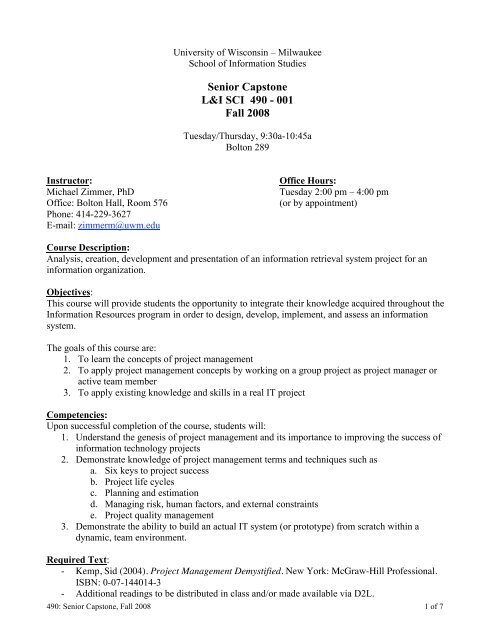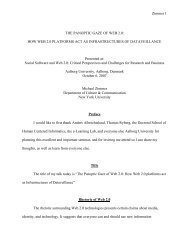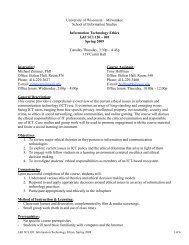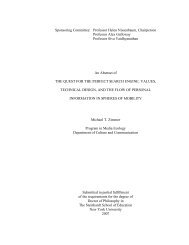490 Senior Capstone Fall 2008.pdf - MichaelZimmer.org
490 Senior Capstone Fall 2008.pdf - MichaelZimmer.org
490 Senior Capstone Fall 2008.pdf - MichaelZimmer.org
Create successful ePaper yourself
Turn your PDF publications into a flip-book with our unique Google optimized e-Paper software.
University of Wisconsin – Milwaukee<br />
School of Information Studies<br />
<strong>Senior</strong> <strong>Capstone</strong><br />
L&I SCI <strong>490</strong> - 001<br />
<strong>Fall</strong> 2008<br />
Tuesday/Thursday, 9:30a-10:45a<br />
Bolton 289<br />
Instructor: Office Hours:<br />
Michael Zimmer, PhD Tuesday 2:00 pm – 4:00 pm<br />
Office: Bolton Hall, Room 576 (or by appointment)<br />
Phone: 414-229-3627<br />
E-mail: zimmerm@uwm.edu<br />
Course Description:<br />
Analysis, creation, development and presentation of an information retrieval system project for an<br />
information <strong>org</strong>anization.<br />
Objectives:<br />
This course will provide students the opportunity to integrate their knowledge acquired throughout the<br />
Information Resources program in order to design, develop, implement, and assess an information<br />
system.<br />
The goals of this course are:<br />
1. To learn the concepts of project management<br />
2. To apply project management concepts by working on a group project as project manager or<br />
active team member<br />
3. To apply existing knowledge and skills in a real IT project<br />
Competencies:<br />
Upon successful completion of the course, students will:<br />
1. Understand the genesis of project management and its importance to improving the success of<br />
information technology projects<br />
2. Demonstrate knowledge of project management terms and techniques such as<br />
a. Six keys to project success<br />
b. Project life cycles<br />
c. Planning and estimation<br />
d. Managing risk, human factors, and external constraints<br />
e. Project quality management<br />
3. Demonstrate the ability to build an actual IT system (or prototype) from scratch within a<br />
dynamic, team environment.<br />
Required Text:<br />
- Kemp, Sid (2004). Project Management Demystified. New York: McGraw-Hill Professional.<br />
ISBN: 0-07-144014-3<br />
- Additional readings to be distributed in class and/or made available via D2L.<br />
<strong>490</strong>: <strong>Senior</strong> <strong>Capstone</strong>, <strong>Fall</strong> 2008 1 of 7
Course Schedule: (subject to change)<br />
Date Topics Reading Assignment<br />
Week<br />
1<br />
Week<br />
2<br />
Week<br />
3<br />
Week<br />
4<br />
Week<br />
5<br />
Week<br />
6<br />
Week<br />
7<br />
Week<br />
8<br />
Week<br />
9<br />
Week<br />
10<br />
Week<br />
11<br />
Week<br />
12<br />
Week<br />
13<br />
Week<br />
14<br />
Week<br />
15<br />
9/2: Course Introduction<br />
9/4: What is Project Management?<br />
9/9: Your Project Management Arsenal<br />
9/11: Group project: discussion & formation<br />
9/16: Team Management & Project Quality<br />
9/18: Group project: selection of project<br />
9/23: Project Life Cycle<br />
9/25: Conceptualization<br />
9/30: Group project: work on Assignment #1<br />
10/2: Group project: work on Assignment<br />
#1<br />
10/7: Analysis<br />
10/9: Group project: work on Assignment #2<br />
10/14: Group project: work on Assignment #2<br />
10/16: Design<br />
10/21: Group project: work on Assignment #3<br />
10/23: Group project: work on Assignment #3<br />
10/28: Development<br />
10/30: Production<br />
11/4: Managing Risk and Change<br />
11/6: Group project: work on Assignment #4<br />
11/11: Group project: discussion<br />
11/13: Group project: development<br />
11/18: Group project: discussion<br />
11/20: Group project: development<br />
11/25: Group project: discussion<br />
11/27: No class (Thanksgiving)<br />
12/2: Group project: development<br />
12/4: Group project: development<br />
12/9: Group project: development<br />
12/11: Project presentations<br />
<strong>490</strong>: <strong>Senior</strong> <strong>Capstone</strong>, <strong>Fall</strong> 2008 2 of 7<br />
Ch. 1<br />
Chs. 2-3<br />
Chs. 12-13<br />
Ch. 4<br />
Ch. 5<br />
Ch. 6<br />
Ch. 7<br />
Ch. 8<br />
Ch. 9<br />
Ch. 11<br />
Individual Assignment #1 due (9/11)<br />
Individual Assignment #2 due (9/18)<br />
Group Assignment #1 due (10/7)<br />
Group Assignment #2 due (10/16)<br />
Group Assignment #3 due (10/28)<br />
Group Assignment #4 due (11/11)<br />
Status report due (11/18)<br />
Status report due (11/25)<br />
Status report due (12/4)<br />
Final group project report due (12/18)
Credit Breakdown:<br />
(see details provided in relevant sections)<br />
Attendance and participation 15 points<br />
Individual assignments 20 points<br />
Group project 65 points<br />
100 points<br />
Grading System:<br />
A 94-100<br />
A- 91-93<br />
B+ 88-90<br />
B 84-87<br />
B- 81-83<br />
C+ 78-80<br />
C 74-77<br />
C- 71-73<br />
D 60-70<br />
F 0-59<br />
Group Project:<br />
The purpose of the team project (2-3 people per team) is to provide students the opportunity to<br />
integrate their knowledge acquired throughout the Information Resources program in order to design,<br />
develop, implement, and assess an information system. As a class, you will select projects, teams,<br />
divide the work amongst team members, selecting a team leader if you desire. Each team will hand in a<br />
final report at the end of the term and give a presentation detailing their project management processes,<br />
and demonstrating the system itself. Grades may vary based on individual performance.<br />
You have a choice of whether to use a real-life situation for the project or make one up. If possible I<br />
would encourage you to find a real-life <strong>org</strong>anization that needs some kind of simple system created.<br />
That way you will have a richer experience dealing with real people (and a real-world information<br />
system to show potential employers!). However, you also have the option of simply making up a case<br />
study (but, of course, the system you design must be real).<br />
Example projects include:<br />
- Student/alumni information database for a department, campus <strong>org</strong>anization, student club<br />
- Web-based information retrieval system for an online archive (documents, images, files, etc)<br />
- Inventory tracking system for a department’s information technology<br />
Real systems take a long time to develop and require extensive testing, training, data conversion, etc.<br />
You probably will not have the opportunity to complete all these tasks. So we will call the system you<br />
produce a prototype. In your project management plans you should include the whole system<br />
development effort, running through initiation, planning, execution of the prototype, execution of the<br />
main system, testing, training, evaluation, etc. However, you will only be required to execute those<br />
plans as far as the end of the prototype stage. The package you submit to me at the end of the course<br />
would be the results of the prototype stage and outline the steps necessary to continue with the full<br />
project.<br />
- Breakdown of Credit: The project is worth 65 points. Within the project, credit will be assigned as<br />
follows:<br />
Project Management Items:<br />
- Group Assignment 1: 5 points<br />
- Group Assignment 2: 5 points<br />
- Group Assignment 3: 5 points<br />
- Group Assignment 4: 10 points<br />
<strong>490</strong>: <strong>Senior</strong> <strong>Capstone</strong>, <strong>Fall</strong> 2008 3 of 7
- Final Project Report: 15 points<br />
System Prototype:<br />
- Project demonstration: 10 points<br />
- Project scope & quality: 15 points<br />
- Distribution of Credit: All students within the group will ordinarily receive the same mark,<br />
reflecting the performance of the group as a whole on project and its components. However, along<br />
with the instructor’s evaluations, each group member will have an opportunity to (anonymously,<br />
when possible) assess the contribution made by each of their colleagues to the final results.<br />
Individual grades may be adjusted based on both instructor and peer evaluation of an individual’s<br />
contributions.<br />
- Work Time: Significant class time will be provided to work on the group projects, but work outside<br />
the classroom will also be necessary. Part of your project management tasks are to coordinate<br />
group sessions outside of the <strong>org</strong>anized course meetings, manage communication, etc.<br />
Class Policies:<br />
- Attendance:<br />
- Students are expected to attend each class, arriving prepared to participate in discussions of the<br />
class material, and, when appropriate, engage in constructive and collaborative group project<br />
work.<br />
- Attendance will be taken at the beginning and end of all class meetings. One class may be<br />
missed without penalty. Missing two classes will result in a penalty on the “Attendance and<br />
participation” grade element. Missing three or more classes will result in immediate and<br />
automatic failure for the entire course.<br />
- Exceptions require the instructor’s approval in advance, and may require written documentation<br />
of medical or family emergencies.<br />
- Participation:<br />
- Each student is expected to actively and constructively participate in class. I will note<br />
contributions by each student in each class meeting to guide the assessment of the “Attendance<br />
and participation” grade element. If you make two well informed and relevant contributions to at<br />
least half the meetings then you should score very well. There is no need to hog the discussion,<br />
and a few quiet meetings will not hurt your score.<br />
- In order to accomplish this objective, it is imperative that you prepare for class – do the readings<br />
beforehand.<br />
- For class meetings dedicated to group project work, your participation will be assessed based on<br />
the constructive and collaborative use of this in-class time to work on your group projects.<br />
- If you feel uncomfortable talking in a group, credit may be awarded for meetings during office<br />
hours, or for answers submitted in writing before the section meets (this consideration requires<br />
advance notice and approval by the instructor).<br />
- Atmosphere for Learning:<br />
<strong>490</strong>: <strong>Senior</strong> <strong>Capstone</strong>, <strong>Fall</strong> 2008 4 of 7
- Students are encouraged to participate in open and frank discussions of the course material, but<br />
are also expected to respect the opinions of other students and to engage in discussion and<br />
debates in a sensitive and respectful manner.<br />
- Before class begins, please turn off all cell phones, pagers, global positioning devices, and any<br />
other items that might ring, buzz, play Beethoven’s Fifth, or otherwise call attention to<br />
themselves and disrupt class.<br />
- Fair warning of things I will take note of, but may not call you on: Coming to class late, leaving<br />
class early, sleeping in class, excessive eating in class, playing on your laptop or texting during<br />
class, doing work for other courses in class, etc. These, or similar, activities will negatively<br />
affect your participation grade.<br />
- Assignments:<br />
- All written assignments must be turned in on time, either via D2L (before class time of the due<br />
date), or at the beginning of class. Any submission during/after class time will be penalized.<br />
Late submissions will not be allowed except for a confirmed emergency with instructor’s<br />
approval.<br />
- Assignments are to be typed, double-spaced, with one inch margins. Use a 12-point kerned font<br />
such as Times New Roman. Multi-page documents should have page numbers and be stapled.<br />
Don’t f<strong>org</strong>et your name, the course number, an assignment description, and the date.<br />
Assignments turned in via D2L should be in .doc or .rtf format.<br />
- Rules of academic conduct require that you not use the work of others without clearly indicating<br />
it as such (using proper and consistent citation formats). Academic misconduct may result in a<br />
lowered grade, no credit for a given assignment, or removal from the course.<br />
- Contacting Me:<br />
- I will be available for short discussions immediately before and after class.<br />
- In person: I will be in my office and available to talk to you during my scheduled office hours<br />
(see above). Other times may be available via prior arrangement.<br />
- By telephone: During my office hours I will also be answering my office telephone. The number<br />
is 414-229-3627. So if you are unable to make it to campus or are an online student you can still<br />
call up to ask questions or seek advice.<br />
- By email: I will respond to class-related emails during normal work hours, and will generally<br />
reply the same day as received (an e-mail sent after working hours, however, may not be replied<br />
to until the next morning). Please be sure to use your UWM e-mail account, identify yourself<br />
and the course, and always use proper and professional e-mail etiquette. (There’s a good guide<br />
to student email etiquette here:<br />
http://www.ust.udel.edu/action/Current%20Students/Academics/email.aspx)<br />
UWM and SOIS Academic Policies:<br />
The following links contain university policies affecting all SOIS students. Many of the links below<br />
may be accessed through a PDF-document maintained by the Secretary of the University:<br />
http://www.uwm.edu/Dept/SecU/SyllabusLinks.pdf.<br />
<strong>490</strong>: <strong>Senior</strong> <strong>Capstone</strong>, <strong>Fall</strong> 2008 5 of 7
Undergraduates may also find the Panther Planner and Undergraduate Student Handbook useful<br />
(http://www.uwm.edu/Dept/OSL/DOS/Handbook2005-06.pdf). For graduate students, there are<br />
additional guidelines from the Graduate School (http://www.uwm.edu/Dept/Grad_Sch/StudentInfo/),<br />
including those found in the Graduate Student and Faculty Handbook:<br />
http://www.uwm.edu/Dept/Grad_Sch/Publications/Handbook/.<br />
- Students with disabilities. If you will need accommodations in order to meet any of the<br />
requirements of a course, please contact the instructor as soon as possible. Students with<br />
disabilities are responsible to communicate directly with the instructor to ensure special<br />
accommodation in a timely manner. There is comprehensive coverage of issues related to<br />
disabilities at the Student Accessibility Center<br />
(http://www.uwm.edu/Dept/DSAD/SAC/MainOffice.html ), important components of which are<br />
expressed here: http://www.uwm.edu/Dept/DSAD/SAC/SACltr.pdf.<br />
- Religious observances. Students’ sincerely held religious beliefs must be reasonably<br />
accommodated with respect to all examinations and other academic requirements, according to the<br />
following policy: http://www.uwm.edu/Dept/SecU/acad%2Badmin_policies/S1.5.htm. Please<br />
notify your instructor within the first three weeks of the <strong>Fall</strong> or Spring Term (first week of shorterterm<br />
or Summer courses) of any specific days or dates on which you request relief from an<br />
examination or academic requirement for religious observances.<br />
- Students called to active military duty. UWM has several policies that accommodate students who<br />
must temporarily lay aside their educational pursuits when called to active duty in the military (see<br />
http://www3.uwm.edu/des/web/registration/militarycallup.cfm), including provisions for refunds,<br />
readmission, grading, and other situations.<br />
- Incompletes. A notation of “incomplete” may be given in lieu of a final grade to a student who has<br />
carried a subject successfully until the end of a semester but who, because of illness or other<br />
unusual and substantial cause beyond the student’s control, has been unable to take or complete the<br />
final examination or some limited amount of other term work. An incomplete is not given unless<br />
the student proves to the instructor that s/he was prevented from completing course requirements<br />
for just cause as indicated above<br />
(http://www.uwm.edu/Dept/SecU/acad%2Badmin_policies/S31.pdf).<br />
- Discriminatory conduct (such as sexual harassment). UWM and SOIS are committed to building<br />
and maintaining a campus environment that recognizes the inherent worth and dignity of every<br />
person, fosters tolerance, sensitivity, understanding, and mutual respect, and encourages the<br />
members of its community to strive to reach their full potential. The UWM policy statement<br />
(http://www.uwm.edu/Dept/SecU/acad%2Badmin_policies/S47.pdf) summarizes and defines<br />
situations that constitute discriminatory conduct. If you have questions, please contact an<br />
appropriate SOIS administrator.<br />
- Academic misconduct. Cheating on exams and plagiarism are violations of the academic honor<br />
code and carry severe sanctions, ranging from a failing grade for a course or assignment to<br />
expulsion from the University. See the following document<br />
(http://www.uwm.edu/Dept/OSL/DOS/conduct.html) or contact the SOIS Investigating Officer<br />
(currently the Associate Dean) for more information.<br />
- Complaints. Students may direct complaints to the SOIS Dean or Associate Dean. If the<br />
complaint allegedly violates a specific university policy, it may be directed to the appropriate<br />
university office responsible for enforcing the policy.<br />
- Grade appeal procedures. A student may appeal a grade on the grounds that it is based on a<br />
capricious or arbitrary decision of the course instructor. Such an appeal shall follow SOIS appeals<br />
<strong>490</strong>: <strong>Senior</strong> <strong>Capstone</strong>, <strong>Fall</strong> 2008 6 of 7
procedures or, in the case of a graduate student, the Graduate School. These procedures are<br />
available in writing from the respective department chairperson or the Academic Dean of the<br />
College/School (http://www.uwm.edu/Dept/SecU/acad%2Badmin_policies/S28.htm).<br />
- Examinations, Finals. The Secretary of the University is authorized to prepare the final<br />
examination schedule. The time of the final examination for an individual or a class may be<br />
changed only with the prior approval of the dean or director of the respective college/school. The<br />
change will involve a postponement to a later date. For individuals with exam conflicts, a separate<br />
week at the very end of the exam week will be reserved to take one of the conflicting exams<br />
(http://www.uwm.edu/Dept/SecU/acad+admin_policies/S22.htm).<br />
<strong>490</strong>: <strong>Senior</strong> <strong>Capstone</strong>, <strong>Fall</strong> 2008 7 of 7






